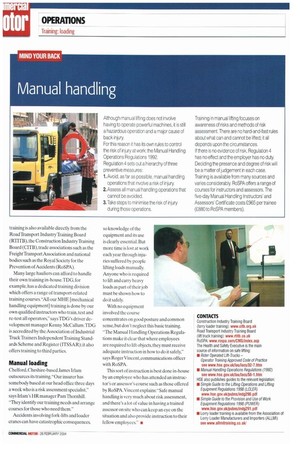training is also available directly from the Road Transport Industry
Page 48

If you've noticed an error in this article please click here to report it so we can fix it.
Training Board (RTITB), the Construction Industry Training Board (CITB).trade associations such as the Freight Transport Association and national bodies such as the Royal Society for the Prevention of Accidents (RoSPA).
Many large hauliers can afford to handle their own training in-house.TDG. for example. has a dedicated training division which offers a range of transport-related training courses. "All our MHE [mechanical handling equipment] training is done by our own qualified instructors who train, test and re-test all operators," says TDG's driver development manager Kenny McCallum.TDG is accredited by the Association of Industrial Truck Trainers Independent Training Standards Scheme and Register (ITSSAR); it also offers training to third parties.
Manual loading Chelford,Cheshire-based James Irlarn outsources its training."Our insurer has somebody based at our head office three days a week who is a risk assessment specialist,says Irlam's HR manager PamThomhill. "They identify our training needs and arrange courses for those who need them."
Accidents involving fork-lifts and loader cranes can have catastrophic consequences. so knowledge of the equipment and its use is clearly essential. But more time is lost at work each year through injuries suffered by people lifting loads manually. Anyone who is required to lift and carry heavy loads as part of their job must be shown how to do it safely.
With no equipment involved the course concentrates on good posture and common sense, but don't neglect this basic training. "The Manual Handling Operations Regulations make it clear that where employees are required to lift objects. they must receive adequate instruction in how to do it safely," says Roger Vincent, communications officer with RoSPA.
This sort of instruction is best done in-house by an employee who has attended an instructor's or assessor's course such as those offered by RoSPA. Vincent explains:"Safe manual handling is very much about risk assessment, and there's a lot of value in having a trained assessor on site who can keep an eye on the situation and also provide instruction to their fellow employees." • CONTACTS Construction Industry Training Board {lorry loader training): vnivi.cifb.org.uk Road Transport Industry Training Board (lift truck training): wwwstilb.co.uk RoSPA: www.rospa.com/CMS/index.asp The Health and Safety Executive is the main source of information on safe lifting:
• Rider Operated Lift-Trucks — Operator Training Approved Code of Practice see www.hse.gov.uk/lau/lacs/32-7.htm • Manual Handling Operations Regulations (1992) see viww.hse.gov.ukilauflacs/56-1.htm HSE also publishes guides to the relevant legislation:
• Simple Guide to the Lifting Operations and Lifting Equipment Regulations 1998 (LOLER) www.hse.gov.ulpubnsTundg29O.pdf
• Simple Guide to the Provision and Use of Work Equipment Regulations 1998 (PUWER) www.hse.gov.uk/pubnsfindg291.pdf • Lorry loader training is available from the Association of Lorry Loader Manufacturers and Importers (ALLMI) see www.allmitraining.co.uk/






























































































































































































